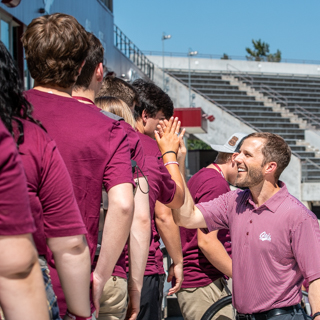Adapting as a University Through the Challenges of COVID-19
April 8, 2020
Dear Colleagues,
Over the past few weeks, I’ve been frequently asked the same question: “How long do you think the impacts of this situation will last?” The answer, as experts around the globe tell us, is difficult to predict. We can predict, however, that this historic event will not only have short-term implications but will also continue to impact students and our society even after the current crisis subsides.
What we also know is that addressing the tremendous challenges of COVID-19 will demand our endurance as a University community, as well as our creativity and courage. It is our collective task, as stewards of this great institution, to not only adapt to meet our students’ needs through the difficulties of the coming weeks and months, but also to think and act strategically to shape what UM looks like on the other side of this crisis. This is a difficult challenge, for sure, but I have tremendous confidence in our collective ability to meet it.
And that confidence is not simply hopeful; it is evidence-based. As we’ve navigated the past month of uncertainty and rapid change, I’ve been repeatedly impressed by the repertoire of skills our employees — faculty, staff, administrators — have drawn upon to meet the demands of this dynamic situation. As a broad team, we’ve put the health and safety of our UM family first and have been unwavering in that commitment, while at the same time going above and beyond to help our students make continued progress in their academic programs.
During a time when the challenges threaten to outstrip familiar strategies and knowledge, we have not chosen comfort or retreat. Instead, we’ve chosen to experiment with new approaches, adjust our plans and, in some cases, transform our practices. Faculty are displaying tremendous creativity in not only changing their teaching modalities but also finding ways to personalize remote learning to keep the connection whole. We have seen staff redouble their efforts to connect with students and families around the nation, helping students persist as Griz facing a new normal. As each challenge has emerged, you have faced it and found solutions. And for that, I am profoundly grateful.
While these urgent adjustments have consumed our day-to-day actions for the past month, it’s also imperative that we plan for UM’s medium- and long-term futures. Summer is rapidly approaching, and the fall semester will be upon us before we know it. While we are planning to be back in-person for the fall semester, it is essential that we prepare contingency plans for multiple scenarios. And it’s important to point out that even if we are back to “normal” for fall semester, we must recognize that some students and families may seek different options to begin or continue their education in the wake of the current situation.
Last week, we formed a cross-sector team – led by Adrea Lawrence, Kirk Lacy and Claudine Cellier, and including leaders from across all of campus – to identify the steps we need to take to best serve our students this summer and in the fall. This mission-based team is working through possible scenarios and identifying strategies that UM could pursue and the steps we need to take to prepare.
Those steps include, for example, adjusting the way we’re interacting with prospective students, and our enrollment team has already created new and innovative ways to connect with students and enable them to visit campus virtually. We also hosted a live town hall last week on Instagram, which was joined live by 620 participants and has been viewed by more than twice as many people since it was posted on YouTube. We’ll be doing another town hall for prospective students – this one on Facebook – at 3 p.m. today. Our enrollment team is also hard at work developing and communicating pathways for students to begin their education in new and innovative ways, such as an early-start option for recent high school graduates whose summer plans may have been derailed, and a remote-start option for students who may want to ease into their college journey.
At the same time, this cross-sector, mission-based team also is exploring the varied scenarios we need to consider with regard to retention of current students, delivery of courses and ways we can serve students here in Missoula whose education plans elsewhere may have been disrupted by this situation. I’m grateful for this team’s ongoing work and for the positive impact it will have on students this summer and fall.
Meanwhile, we recognize that we must also look farther ahead and ask ourselves who we want to be on the other side of this, and begin exploring how we can build toward that future. In the coming weeks, I will share how we will approach this collective, longer-term, strategic thinking, beginning with the forming of a University Design Team, which will work through the summer and fall to ensure we reserve time and energy to look forward. Again, I am confident that our future is in the very capable hands of our faculty and staff members who have already demonstrated incredible resilience, determination and creativity through this situation.
And so while we each continue to focus on the immediate, please know that many of us also are spending time in deep discussion not just about how our University will emerge from this crisis but especially about the role UM will play in the future of not only our state, but our region and our nation. The actions we take today will impact generations to come.
I am proud of the work we have done as a community to prove our capacity for creative adaptation and sustained commitment to what marks UM as distinct. I have no doubt we will continue to do so in the days, weeks and months to come — and I look forward to all we will accomplish, together.
Seth